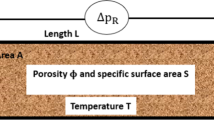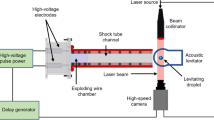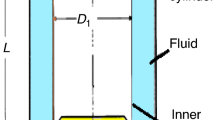Abstract
This work uses the Scanning Brookfield Test (SBT) in order to carry out an experimental testing of an oil gelation process under shearing. This test measures viscosity continuously at constant shear rate of 2 s−1 as the oil is cooled at a constant rate of 1°C per hour from −5 to −45°C. Apart from this standard way of running we changed the measuring conditions (basically by cooling the oil at quiescent temperature up to a desirable temperature), which permitted us to evaluate the real influence of a soft shearing on the rheology of a lubricant oil. We observed the slowing down of the gelation process of a lubricant oil subjected to shearing, which was explained due to the alignment of the crystal platelets in the way of the shear and the subsequent slowing down of the probability of collision. The use of a mathematical approach that uses the homogeneous nucleation theory and it takes into account the Bachelor equation permitted us to find a mathematical expression that provides the relative viscosity of the oil versus the temperature. This explains the slowing down of the gelation process caused by the shearing of the lubricant oil.
Similar content being viewed by others
References
T. W. Selby, “The scanning Brookfield technique of low-temperature, low-shear Rheology—its inception, development, and applications,” in Low Temperature Lubricant Rheology Measurement and Relevance to Engine Operation, ASTM STP 1143, Ed. by R. B. Rhodes (ASTM International, West Conshohocken, PA, 1992).
ASTM Standard D 5133-05. Test Method for Low Temperature, Low Shear Rate, Viscosity/Temperature Dependence of Lubricating Oils Using a Temperature Scanning Technique (Annual Book of ASTM Standards, ASTM International, West Conshohocken, PA, 2005).
ASTM Standard D 4684-08. Test Method for Determination of Yield Stress and Apparent Viscosity of Engine Oils at Low Temperature, Annual Book of ASTM Standards (ASTM International, West Conshohocken, PA, 2008).
J. A. Maroto-Centeno, T. Pérez-Gutiérrez, and M. Quesada-Pérez, J. Testing and Evaluation 41, 2 (2012).
J. A. Maroto-Centeno, T. Pérez-Gutiérrez, and M. Quesada-Pérez, Mat.-Wiss Werkstoffech. 44, 5 (2013).
R. Venkatesan, N. R. Nagarajan, K. Paso, et al., Chemical Engineering Sci. 60, (2005).
F. W. Ostwald, Z. Phys. Chem. 22, (1987).
S. Auer and D. Frenkel, Nature 413, (2001).
A. G. Walton, Nucleation in Liquids and Solutions, Ed. by A. C. Zettlemoyer (New York, 1969).
J. W. Mullin, Crystallization, 4th Edition (Butterworth Hinemann, Oxford, 2001).
G. K. Bachelor, J. Fluid Mech. 83, (1977).
T. W. Selby, “Pumpability. Past accomplishments; present and future challenges, oil flow studies at low temperatures in Moder engines,” in ASTM STP 1388, Ed. by H. Shaub (ASTM International, West Conshohocken, PA, 2000).
R. G. Larson, Rheol. Acta 31, (1992).
L. Dagdug, M. V. Vazquez, A. M. Berezhkovskii, et al., J. Chem. Phys. 136, (2012).
Author information
Authors and Affiliations
Corresponding author
Additional information
The article is published in the original.
Rights and permissions
About this article
Cite this article
Maroto-Centeno, J.A., Pérez-Gutiérrez, T. & Quesada-Pérez, M. Experimental testing and theoretical characterization of an oil gelation process under shearing. Pet. Chem. 55, 252–258 (2015). https://doi.org/10.1134/S0965544115030032
Received:
Published:
Issue Date:
DOI: https://doi.org/10.1134/S0965544115030032




